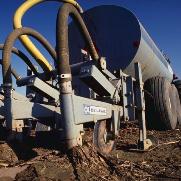Injecting poultry manure to reduce P-run-off

Injecting liquefied manure into the soil may be the key to reducing phosphorus runoff at poultry and other animal farms.
Peter Kleinman, a soil scientist with the U.S. Agricultural Research Service (ARS), has been studying this method of injection on Delmarva Peninsula, according to an ARS news release.
Each year, Delmarva’s approximately 2,700 poultry farms raise about 570 million chickens, which produce more than 0.5 million tonnes of litter. This litter is an ideal fertilizer for corn, soybeans, and other Delmarva crops, according to ARS.
However, spreading it over the soil surface exposes nutrients, such as phosphorus, to runoff that can drain into the bay’s surrounding waters, triggering algal blooms that block sunlight and deprive fish, crabs, and other forms of aquatic life of oxygen.
The increasingly popular use of no-till farming compounds the problem, according to Kleinman, who works at the ARS Pasture Systems and Watershed Management Research Laboratory in University Park, Pa.
Since 2005, Kleinman has been researching fertilizer-application equipment called injectors, which squirt liquefied manure below the soil surface.













